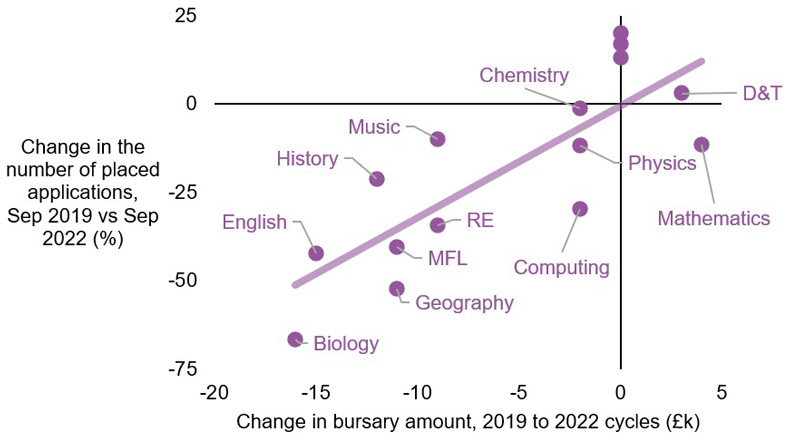Secondary subjects with the largest reduction in teacher bursaries attracted the fewest trainees in this year’s “grim” recruitment drive, new analysis shows.
The findings suggest the decision by ministers to slash bursaries after the short-lived recruitment boom during the first year of Covid is now “compounding” challenges.
Ministers are likely to miss their secondary trainee teacher target for next year by a third, the ninth time in the past ten years that targets have been missed.
John Howson, the chair of the teacher vacancy site TeachVac, said it was “grim news”.
Figures from the National Foundation for Educational Research (NFER) show a strong correlation between subjects with the largest falls in recruits and the biggest drop in bursaries.
Jack Worth, the NFER’s schools workforce lead, said cutting bursaries in 2020 after the Covid surge “made some sense” to “discourage over-recruitment” and save money.
“However, lower bursaries are now compounding the very challenging recruitment situation due to the wider labour market recovery.”
There was a 67 per cent drop in placed applicants in biology this month compared with September 2019 (falling from 1,900 to 635 recruits).

The subject also had the biggest bursary cut for trainees with a 2:1 degree, falling from £26,000 in 2019 to £10,000 this year.
Geography, which had the second largest fall in placed applicants (52 per cent), had the joint-third biggest drop in bursary funding (£26,000 to £15,000).
The bursary for English, where the number of applicants dropped 42 per cent from 2,770 in 2019 to 1,597 this year, fell from £15,000 to zero over the same period.
However, applicants for chemistry mostly held up. It had a drop of just £2,000 on its £26,000 bursary of 2019.
Ministers face call to raise teacher bursaries
Worth said bursaries were an “effective short-term measure for increasing recruitment. We recommend government increases them to boost recruitment in the face of increasing supply challenges, particularly in subjects such as English and biology.”
Research suggests a bursary increase of £1,000 is associated with about a 3 per cent increase in recruitment. However, the reverse is also true.
Government data showed just 12,646 applicants were recruited as of Monday to start secondary teacher training courses next year.
Teach First was not included in the figures. But assuming the provider recruits the same proportion of trainees as last year, it means ministers will miss their target of 20,945 secondary recruits by a third.
Schools Week analysis has included candidates with confirmed or conditional places, those who had received an offer but not responded and those still awaiting decisions, meaning the figures represent a best-case scenario.
Worth said it was “very hard to overstate how dreadfully bad” the numbers are.
The already gloomy outlook has worsened since August when a Schools Week analysis suggested the target would be missed by a quarter.
The drop appears to have been driven by more unsuccessful applications.
While there were 43,949 unsuccessful secondary ITT applicants as of August 15, the figure had jumped to 47,602 as of last week.
Howson suggests the disparity could be down to a “tidying up of unresolved applications by providers”, particularly where staff were on holiday during the summer.
The statistics include applicants who registered through the government’s “Apply for teacher training” service, the main route for ITT courses in England.
Applicants who have applied directly through their provider are not included in the data.
Final teacher training recruitment figures will be published in December.
A Department for Education spokesperson said the number of teachers in the state school system was at a record high of 465,000 – 24,000 more than in 2010.
“Tax-free bursaries and scholarships worth £24,000 and £26,000 respectively are available to encourage talented trainees to key subjects,” a spokesperson added.
“Teacher’s starting salaries will significantly increase from September, with pay rising 8.9% to £28,000 outside London, alongside other substantial increases for more experienced teachers.”









Quick comment on the relatively good new re Chemistry teachers. A huge number of teacher trainees have degrees that could let them train in either Biology or Chemistry (as well as straight Biochemistry there’s also Environmental Science, Forensics, etc) – and they’ll just go where the bursary is greater. In practical terms they’ll probably end up teaching both subjects (and Physics)! So this year they’ve abandoned Biology for the Chemistry bursaries.